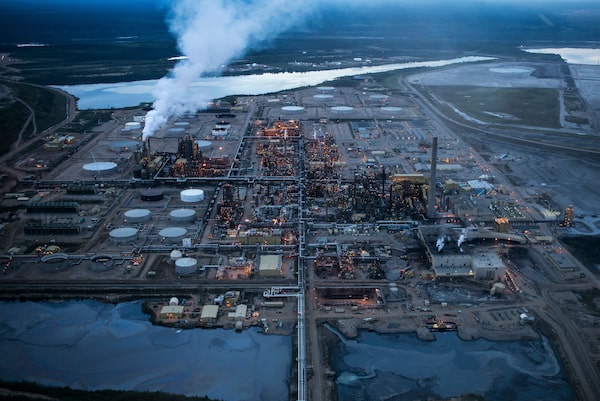
The Syncrude Canada plant at the Athabasca oil sands near Fort McMurray, Alta, on Aug. 28, 2015.IAN WILLMS/The New York Times
Alberta, long criticized as an environmental laggard, has set a goal of creating a carbon-neutral economy by 2050, matching a target date set by the federal government for the rest of the country.
However, the road map depends on technology that is not yet viable, regulations that do not yet exist and interim targets that have not yet been set.
The plan, first reported by The Globe and Mail, marks the first time the provincial government has stated it intends to operate a net-zero economy by 2050. Alberta’s path, according to the 66-page outline, is designed to ensure its prosperity remains buoyed by the emissions-intense oil and gas industry. The province insists its homegrown strategy is superior to any coming from Ottawa because Alberta is best positioned to determine what is realistic and necessary to reduce its carbon footprint.
Alberta is a flashpoint in Canada’s contribution to the international race to try to limit the rise in temperatures to 1.5 C above preindustrial levels. The province’s new climate strategy, dubbed the Alberta Emissions Reduction and Energy Development Plan, counts heavily on carbon capture, utilization and storage projects flourishing. It also calls for further study in key industries to identify opportunities to reduce emissions, policies necessary to speed up those reductions, potential technological advancements, and associated costs and timelines. Alberta argued it must first determine what is possible before setting targets or imposing new regulatory standards.
“We are not looking at legislating an aspiration to net zero,” Sonya Savage, Alberta’s Minister of Environment and Protected Areas, told reporters Wednesday. “But someday, another minister, another government, may say: ‘You know what? We’re getting there. We’re well on track to it. Let’s put it into legislation to showcase it to the world.’”
Canada has committed, with its global allies, to reduce emissions to net zero by 2050, and has set an interim target of cutting greenhouse gases by 40 to 45 per cent from 2005 levels by 2030. The energy sector is a major contributor to carbon emissions, but Alberta politicians of all stripes have complained that Ottawa’s pledge of reducing oil and gas emissions by 42 per cent within the next seven years is unrealistic.
Two years ago, the Paris-based International Energy Agency said global net-zero ambitions hinge upon a halt to spending on any new fossil fuel supply projects beyond those already committed. Meanwhile, fossil fuel use must fall from four-fifths of energy supply to slightly more than one-fifth by 2050, the agency said. Since its report, supply disruptions caused by the Russian invasion of Ukraine show just how difficult the transition away from fossil fuels will be, as surging oil and gas prices fuel inflation.
This is the first major climate announcement from Alberta’s United Conservative Party, which assumed power four years ago. Premier Danielle Smith, who has a confrontational relationship with Ottawa, especially when it comes to developing and regulating the province’s energy resources, was not part of the unveiling. Ms. Savage, who previously served as Alberta’s energy minister, is not running in next month’s provincial election.
Ms. Savage acknowledged Alberta has been slow to act. “We’re behind,” she said, adding she wished the government had produced this plan two years ago. “We know we have work to do.”
The document stressed the importance of ensuring carbon neutrality does not compromise access to affordable, reliable and secure energy. It defined net zero as balancing greenhouse gas emissions with natural or technological sequestration or by acquiring carbon credits from other countries. The plan is designed to protect economic growth.
“This will require new technologies that are not currently scalable or even viable. Our approach is to attract investment by creating a regulatory and investment climate that is predictable, agile and certain,” the government plan said. Much of the document rehashed Alberta’s previous efforts to reduce emissions.
The federal government, which is dealing with a public workers’ strike across the country, declined to comment on Alberta’s announcement.
Simon Dyer, the deputy executive director at the Pembina Institute, said the climate strategy lacks the urgency necessary in 2023. Without a fresh framework, the technological advancements Alberta is counting on, for example, will fail to materialize.
“Voluntary measures do not work. We need clear rules,” he said. “Companies innovate and invest in decarbonization when they are required to by rules. Technology doesn’t magically appear.”
He pointed to Alberta’s success with coal regulations. Coal, in 2016, produced 50 per cent of the province’s electricity, according to the government document. However, the province expects to end its use of coal in 2023, seven years ahead of the deadline imposed by the New Democratic Party when it ruled Alberta.
“This represents the biggest greenhouse gas emissions reduction in Alberta’s history and an unrivalled achievement by any other Canadian jurisdiction,” the climate report said in a section detailing the province’s achievements with respect to electricity.
Editor’s note: This article should have quoted the International Energy Agency as saying global net-zero ambitions hinge upon a halt to spending on any new fossil fuel supply projects, rather than a halt to spending on projects that have no carbon-capture technology.
With a report from Jeffrey Jones